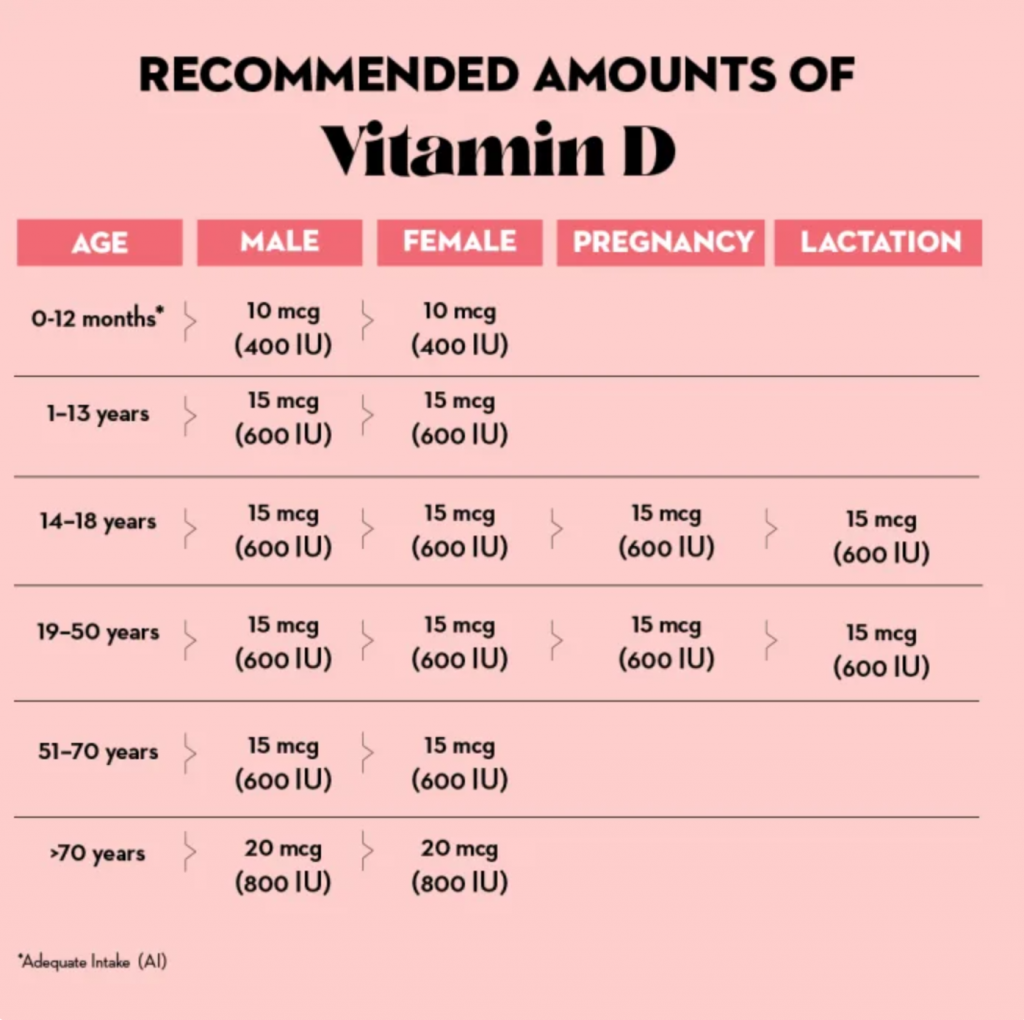Recently, vitamin D has become more and more shiny. And it’s not just because it’s the “sunshine vitamin.” Health professionals, scientists and experts are increasingly recognizing the importance of vitamin D and its role in optimal health and well-being.
Vitamin D is a fat-soluble vitamin that is essential for many body functions, including strengthening bones, supporting cell growth and regulation, retaining and absorbing calcium and phosphorus, and boosting immunity. Vitamin D is found naturally in some foods and when consumed in excess, it is stored in the body instead of being excreted in urine like many other vitamins.
Unfortunately, most Americans do not get enough vitamin D in their diet, and as a result many people are deficient. In addition to getting vitamin D from food, you may also need some help to keep your vitamin D levels within normal limits. Thankfully, with the help of a doctor-approved supplement, you’ll be healthier in no time.
Here are six health benefits that will keep your vitamin D levels in check.
- It supports immunity
Vitamin D keeps your immune system in tip-top shape. It regulates innate and adaptive immune responses in the body by interacting with vitamin D receptors on immune cells and modulating their activity. A lack of vitamin D may increase the risk of immune-related diseases, a study suggests. The body needs adequate vitamin D to help fight disease-causing bacteria such as viruses, bacteria and parasites. - It may help improve your mood
People with depression often have low levels of vitamin D, but some studies have shown that a lack of vitamin D does not necessarily cause depression. People with depression may have poor appetite, lack self-care and be more withdrawn, putting them at risk for vitamin D deficiency. This is because when dealing with depression, you may not be getting enough nutrition or exposure to sunlight (due to isolation) to maintain your vitamin D levels healthy.
Vitamin D has been shown to increase production of the “feel-good” hormone serotonin, which is responsible for regulating mood and preventing high levels of anxiety and depression. A small study found that vitamin D supplementation improved mood and significantly reduced depression and anxiety in women with type 2 diabetes, but larger studies are needed to confirm this.
- It may reduce the risk of heart disease
Heart disease is still the number one cause of death in the country, so it is imperative that you do your best to maintain a healthy heart. Like skeletal muscle, heart muscle is regulated when vitamin D interacts with vitamin D receptors in cells. Speaking of blood pressure, vitamin D regulates blood pressure by acting on endothelial cells and smooth muscle cells. Not only that, it plays an important role in helping to strengthen muscle fibers, which in turn protects the heart. In addition, vitamin D can help keep arteries elastic and relaxed, which is also good for blood pressure. Although vitamin D deficiency has been linked to various cardiovascular risk factors, more research is needed to determine the protective effects of vitamin D on the heart. - It makes your bones strong
Vitamin D is essential for bone health. Specifically, it enhances the absorption of calcium from the small intestine and promotes osteoclast differentiation (a type of bone cell that breaks down bone tissue) and calcium reabsorption from the bone. In addition, vitamin D promotes the mineralization of collagen matrix in bone. Vitamin D’s role in calcium absorption and bone health also strengthens teeth and reduces the risk of tooth decay and gum disease. For children, getting a safe amount of vitamin D is especially important for bone health during bone development. In fact, children with low vitamin D levels are at higher risk of rickets, which can cause weak bones and other bone deformities. - It might energize you
If you’re constantly tired, getting more vitamin D might give you the energy you need. Vitamin D has an effect on the function of mitochondria, the energy-producing part of cells. A 2016 study found that vitamin D treatment significantly improved fatigue in healthy people who were deficient in vitamin D. Another study showed that vitamin D supplementation improved fatigue in kidney transplant recipients. - It promotes the production of female sex hormones
Vitamin D deficiency is extremely common among women of childbearing age. Recent studies have shown that vitamin D plays a crucial role in helping regulate female sex hormones and that low vitamin D levels increase the risk of poor maternal and fetal health outcomes. In addition, low levels of vitamin D can lead to certain hormonal disorders, including polycystic ovary syndrome (a symptom of sex hormone imbalance), which affects 5 million women in the United States. If you’re struggling with PMS, the good news is that getting enough vitamin D can reduce symptoms, according to a systematic review. Vitamin D supplementation may have some beneficial effects on clinical pregnancy and birth outcomes, but the results remain inconsistent and more research is needed to support this claim.
The two main forms of vitamin D
Vitamin D comes in two main forms :D2(ergocalciferol) and D3(cholecalciferol). There is not much difference between the two, except that D2 is naturally found in plants and D3 is naturally found in animals and is produced by skin when exposed to sunlight. Vitamin D is also classified according to its active form of 25-OH-Vit D(from the kidney) and calcitriol (from the liver). The good news is that you can meet your vitamin D needs with any form of vitamin D, but most health experts recommend supplementation with vitamin D3 because it is more effective at raising vitamin D levels compared to vitamin D2. In addition, it lasts longer in the body.
Vitamin D food sources
Now you know the importance of getting enough vitamin D in your diet for good health. Here are the top vitamin D-rich foods you need to supplement to keep your vitamin D levels up to par:
Supplements and Foods
When it comes to vitamin D, there are some foods that naturally contain vitamin D, although some foods are fortified with it, such as orange juice, milk, or some grains. It’s best to get your nutrients from food first, as it’s more effective, but sometimes relying on food alone can be challenging. Healthcare providers may recommend a supplement to help you meet your daily vitamin D needs and ensure that your levels are within normal limits. The key is not to overdo it.
Vitamin D supplements are generally safe, but excessive consumption can lead to hypercalcemia, a condition in which the amount of calcium in the blood is too high, leading to gastrointestinal problems, weakness and kidney stones. Vitamin D supplements are also often recommended for people with fat absorption problems, lactose intolerance, milk allergy, or certain medical conditions that prevent them from going outside. When taking supplements, you will want to take them with meals to boost absorption.

Signs of vitamin D deficiency
- Fatigue
- Mood changes
- Muscle pain and weakness
- Reduced immune function
- Increased inflammation
- Frequent infections
- Rickets (in children)
- Bone disorders
If you have vitamin D deficiency, which is determined through a blood test, the treatment is typically through supplementation. Check with your healthcare provider about the dose, how often you need to take it and how long you should take it for.
Who is at risk for a vitamin D deficiency?
Melanin is one of the primary factors that affect the synthesis of vitamin D through skin exposure to sunlight. As a result, people of color with darker skin tones are at higher risk of vitamin D deficiency as their body is not able to produce vitamin D properly. Individuals at higher risk for deficiency include the elderly, those with minimal exposure to sunlight and people who avoid dairy or fatty fish.
Recommended amounts of vitamin D throughout the life cycle

Reference: National Institutes of Health, Office of Dietary Supplements
Most people need about 600 IU per day, but people over the age of 70 need a little more, somewhere around 800 IU to reduce the risk of common bone disorders, like osteoporosis, a disease that weakens the bones. Talk to your healthcare provider today about your vitamin D level.




